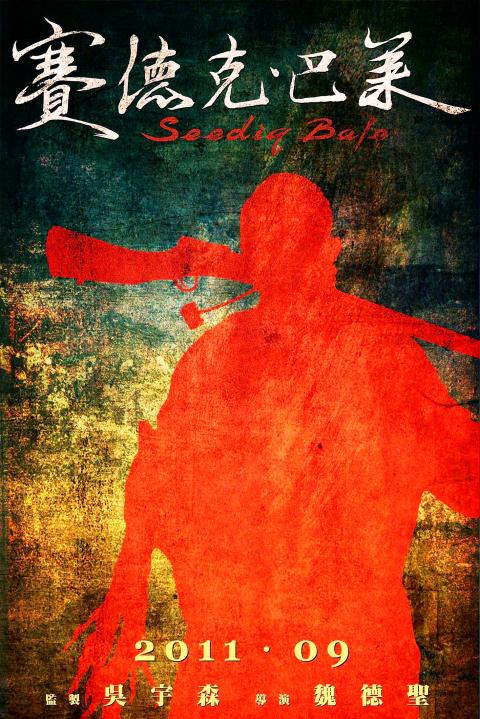The nation’s first epic feature film directed by Wei Te-sheng (魏德聖), the maker of the blockbuster hit Cape No. 7 (海角七號), will hit theaters in two parts in September.
After the success of Cape No. 7, which enjoyed the second--biggest box office sales in the nation’s cinematic history, Wei has spent at least NT$600 million (US$20.7 million) to make Seediq Bale (賽德克巴萊).
The epic is based on the most famous and most violent of the anti-Japanese uprisings during the nation’s Japanese colonial period, know as the Wushe Incident, in which Sediq hero Mona Rudao led his tribe in a rebellion against Japanese military forces in 1930.

Photo provided courtesy of ARS Film Production
The incident occurred in what is now Renai Township (仁愛), Nantou County.
The Sediqs are the nation’s 14th officially recognized Aboriginal tribe and have a population of between 6,000 and 7,000.
Featuring a cast of 15,000 and produced by a 400-person technical production crew from Taiwan, Japan and South Korea, Wei said that Seediq Bale was in post--production and would be released in two parts.
The first part, scheduled to be released on Sept. 9, will center on the portrayal of the major characters and the atmosphere of the colonial era. The second part, to be released on Sept. 30, will revolve around the uprising of the Sediq tribe and its suppression by the Japanese army, the director said.
Each part will run for at least two hours, he said.
“Seediq Bale means ‘a real man’ in the language of the Sediq. I am truly grateful for the dedication that my crew showed. Without them, it would never have been possible for me to create this world-class Taiwanese epic feature,” Wei said on Friday.
Despite the huge budget for a local production, some of the crew were not paid for as much as two months of work during the 10-month shoot.
Wei will meet his fans on Feb. 12 and Feb. 13 at the Taipei International Book Exhibition at the World Trade Center.

Taiwan is stepping up plans to create self-sufficient supply chains for combat drones and increase foreign orders from the US to counter China’s numerical superiority, a defense official said on Saturday. Commenting on condition of anonymity, the official said the nation’s armed forces are in agreement with US Admiral Samuel Paparo’s assessment that Taiwan’s military must be prepared to turn the nation’s waters into a “hellscape” for the Chinese People’s Liberation Army (PLA). Paparo, the commander of the US Indo-Pacific Command, reiterated the concept during a Congressional hearing in Washington on Wednesday. He first coined the term in a security conference last

DEFENSE: The National Security Bureau promised to expand communication and intelligence cooperation with global partners and enhance its strategic analytical skills China has not only increased military exercises and “gray zone” tactics against Taiwan this year, but also continues to recruit military personnel for espionage, the National Security Bureau (NSB) said yesterday in a report to the Legislative Yuan. The bureau submitted the report ahead of NSB Director-General Tsai Ming-yen’s (蔡明彥) appearance before the Foreign and National Defense Committee today. Last year, the Chinese People’s Liberation Army (PLA) conducted “Joint Sword-2024A and B” military exercises targeting Taiwan and carried out 40 combat readiness patrols, the bureau said. In addition, Chinese military aircraft entered Taiwan’s airspace 3,070 times last year, up about

A magnitude 4.3 earthquake struck eastern Taiwan's Hualien County at 8:31am today, according to the Central Weather Administration (CWA). The epicenter of the temblor was located in Hualien County, about 70.3 kilometers south southwest of Hualien County Hall, at a depth of 23.2km, according to the administration. There were no immediate reports of damage resulting from the quake. The earthquake's intensity, which gauges the actual effect of a temblor, was highest in Taitung County, where it measured 3 on Taiwan's 7-tier intensity scale. The quake also measured an intensity of 2 in Hualien and Nantou counties, the CWA said.

The Overseas Community Affairs Council (OCAC) yesterday announced a fundraising campaign to support survivors of the magnitude 7.7 earthquake that struck Myanmar on March 28, with two prayer events scheduled in Taipei and Taichung later this week. “While initial rescue operations have concluded [in Myanmar], many survivors are now facing increasingly difficult living conditions,” OCAC Minister Hsu Chia-ching (徐佳青) told a news conference in Taipei. The fundraising campaign, which runs through May 31, is focused on supporting the reconstruction of damaged overseas compatriot schools, assisting students from Myanmar in Taiwan, and providing essential items, such as drinking water, food and medical supplies,